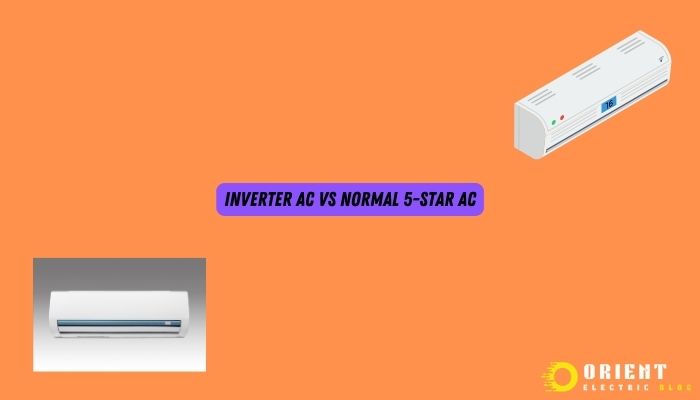When selecting an air conditioner for your home or office, you are frequently presented with several options, each with its benefits and drawbacks. Among these different air conditioner options available in the market, two popular choices are inverter ac vs normal 5 star ac.
While both air conditioners are intended to keep you cool and comfortable, they operate differently and provide different benefits.
Inverter AC vs Normal 5star AC:
This blog post will examine the differences between inverter ac vs normal 5 star ac to help you decide which is best for your needs and preferences.

Energy efficiency:
One of the most significant differences between inverter AC and standard 5-star AC is their energy efficiency. Compared to standard 5-star AC, inverter AC is known for its high energy efficiency. This is because inverter air conditioners use variable speed compressors, which adjust their speed based on the room’s temperature.
This means they only use the energy needed to maintain the desired temperature, making them extremely energy efficient.
Standard 5-star AC, on the other hand, employs a fixed-speed compressor that operates at total capacity until the desired temperature is reached and then shuts down. When the temperature rises again, the compressor restarts at total capacity, consuming more energy than is necessary.
Inverter air conditioners use 30-50% less electricity than standard 5-star air conditioners, resulting in lower electricity bills and a lower carbon footprint. They also have a longer lifespan because they do not have frequent on-off cycles, which can stress the compressor and other AC components.
Cooling Performance:
Regarding cooling performance, inverters and standard 5-star air conditioners are designed to keep you cool and comfortable during the hot summer months. However, some operational differences can affect their cooling performance.
Inverter air conditioners have variable-speed compressors that adjust their cooling capacity based on the room’s temperature. This means they can cool the space more efficiently and evenly by maintaining a constant temperature without frequently turning it on and off. This results in faster and more consistent cooling, making them ideal for areas that experience frequent temperature fluctuations.
Ordinary 5-star ACs, on the other hand, have a fixed-speed compressor that operates at total capacity until the desired temperature is reached, after which it switches off. The compressor kicks into high gear when the temperature rises again, causing fluctuations and uneven cooling.
However, both air conditioners can achieve the same level of cooling if they are appropriately sized for the room in which they are installed. As a result, when choosing an air conditioner, it is critical to consider the size of the room, the number of occupants, and other factors.
Noise Level:
Inverter air conditioners are generally quieter than standard 5-star air conditioners regarding noise levels. This is due to variable speed compressors in inverter air conditioners, which can adjust their speed based on the room’s temperature.
This means that when the room temperature is near the desired temperature, the compressor can run at a lower rate and produce less noise. Inverter ACs also have a better design and use sound-absorbing materials, which help to reduce noise levels.
Ordinary 5-star ACs, on the other hand, have a fixed-speed compressor that runs at total capacity until the desired temperature is reached, after which it switches off. When the temperature rises again, the compressor kicks into high gear, making more noise than inverter ACs. Additionally, ordinary 5-star ACs have a more straightforward design and may not use sound-absorbing materials, making them noisier than inverter ACs.
It is important to note, however, that the noise level of an air conditioner can vary depending on its brand, model, and installation location. Furthermore, as the AC ages, the noise level may rise due to component wear and tear.
Maintenance and Durability:
Both inverter AC and standard 5-star AC have advantages and disadvantages regarding maintenance and durability.
Because they do not have frequent on-off cycles, inverter ACs require less maintenance than standard 5-star ACs. Inverter air conditioners are also better designed and use advanced technologies that reduce wear and tear, resulting in a longer lifespan.
Ordinary 5-star air conditioners, on the other hand, may necessitate more maintenance due to frequent on-off cycles that cause wear and tear on their components. However, because their members are more straightforward and readily available, they are generally easier and less expensive to repair.
In terms of durability, both inverter AC and standard 5-star AC can last many years if properly maintained and used in the appropriate conditions. Therefore, to ensure maximum durability, choose an AC from a reputable brand, select the proper size for your room, and install it in a suitable location.
Key Comparison:
Inverter AC vs. Normal 5-Star AC Comparison Table:
Features | Inverter AC | Normal 5-star AC |
Energy Efficiency | High energy efficiency, consuming 30-50% less electricity | Lower energy efficiency, consuming more electricity |
Cooling Performance | Can cool more efficiently and evenly due to variable speed compressors | This may result in temperature fluctuations and uneven cooling due to fixed-speed compressors |
Noise Level | Generally quieter due to variable speed compressors and sound-absorbing materials | It may produce more noise due to fixed-speed compressors and more straightforward design |
Maintenance and Durability | Require less maintenance due to advanced technologies and longer lifespan | It may require more maintenance due to frequent on-off cycles, but easier and cheaper to repair |
Conclusion:
Inverter ACs are highly energy-efficient, provide faster and more consistent cooling, operate quietly, and require less maintenance due to advanced technologies.
Ordinary 5-star ACs, on the other hand, may have lower energy efficiency, resulting in temperature fluctuations and uneven cooling, producing more noise, and necessitating more maintenance due to frequent on-off cycles.
While selecting the appropriate type of AC, it is critical to consider the size of the room, the number of occupants, and other factors.
